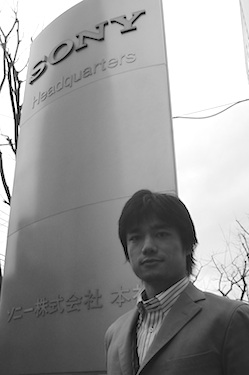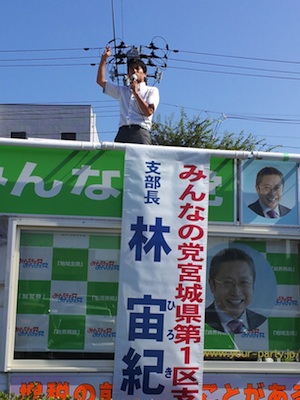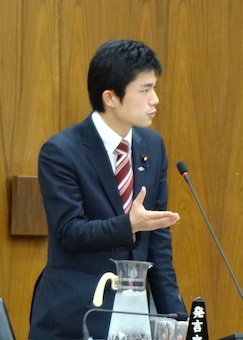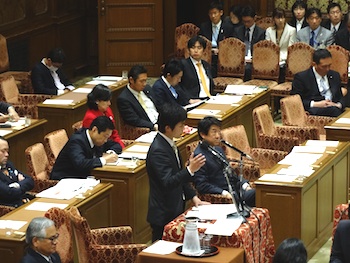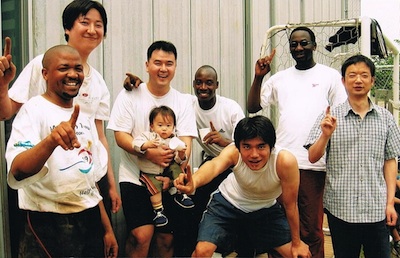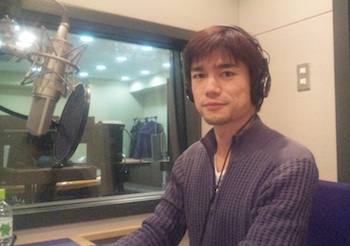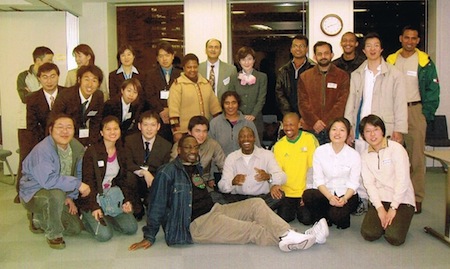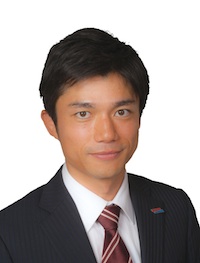 Hiroki Hayashi, Japan
Hiroki Hayashi, Japan
Member of the Diet of Japan
International Development Studies Program (’04)
Hiroki Hayashi was elected as Diet member for “Minna no To” (Your Party) at the latest general elections in December 2012. As a fresh graduate from the Education Department of Tokyo University, Hiroki was selected for the International Development Studies Program at GRIPS in 2002. After his graduation from the program in March 2004, he started working at the Finance Department of Sony Corporation. After two years, an opportunity came up to become a TV newscaster and radio DJ and Hiroki spent the next six years working for several broadcasting companies in the Kanto region.
Being born and raised in the Tohoku area, the Great East Japan Earthquake and Tsunami was another turning point in his career that made him decide to go into politics and put his energy into the reconstruction and revitalization of the affected areas.
In an interview Hiroki tells us about his motivations to change jobs and pursue a rather unusual career.
Please tell us about your career thus far. What is your area of specialization and how did you come to work in this area?
After having graduated from GRIPS, I began to work at Sony. I followed the advice of the late professor Yujiro Hayami, who said once that even if we want to work in the international cooperation field, we should first gain experience in the private sector. I think what he meant was that learning about the operations of cost-conscious organizations, and about how to generate profits, are essential skills to make international cooperation operations sustainable. At Sony, I worked at the Finance Department.
After some time spent in the private sector, I began to think about working for a NPO or a governmental organization, but then an opportunity to work as a TV and radio presenter came up. I thought that being on the air could be both challenging and meaningful for a future career in the international cooperation field, so I decided to make a detour by entering the broadcasting world.
You were elected as Diet member for the “Minna no Tō” (Your Party) in December 2012. How and why did you decide to get into politics?
What made me get involved into politics is the Great East Japan Earthquake and Tsunami that hit Japan on March 11th, , 2011. I am from Miyagi Prefecture in Tohoku, and many places I love had been washed away by the earthquake and tsunami. After the disaster, I went to the devastated areas almost every weekend to participate in volunteer activities.
I was expecting that during those hard times, politicians would work hand in hand for the reconstruction of the devastated areas, but instead it appeared that they were more than ever fighting for power, abandoning those who needed help the most in the Tohoku region.
Looking at this political situation I really started to worry about the reconstruction and whether our children and grandchildren would ever be able to grow up with a feeling of pride for the country. I realized that political reform is badly needed, and so I decided to enter politics myself.
As a Diet member, what are your main tasks and responsibilities? And what are you hoping to achieve?
Since “Your Party” is an opposition party, it is our primary job to check budget proposals and policies and bills proposed by the ruling government and to present amendments if necessary.
I am now a member of three governmental committees:
- The Committee for Agriculture, Forestry and Fisheries
- The Great East Japan Reconstruction Committee
- The committee for counter-terrorism and anti-piracy measures
In these three committees, I scrutinize the bills and measures proposed by the government and submit suggestions for an improved version based on my party’s manifest.
My main goal now is not only to accelerate the reconstruction of the stricken Tohoku area so it can regain its vitality as soon as possible, but also to develop new industries in these areas that can play a major role in the Japanese economy in the future.
In your current capacity, what do you see as the main opportunities and challenges for Japan over the course of the next five to ten years?
I believe the two main issues we have to deal with in the coming years are firstly, how to transform the current social security system into a more sustainable one. And secondly, we must think about Japan’s capacity to develop new technologies and new products in a world that is becoming more and more globalized.
What are some of the biggest challenges you face in your work?
I have to absorb a vast amount of knowledge and information. I always feel like I don’t have enough time.
As a politician, the first step before starting to think about any new initiatives and projects you have to look back and reflect on past failures and ask yourself why they failed. But with such a vast amount of information to assimilate, the harder I try, the more difficult it gets. If anyone knows a good method to assimilate a lot of information quickly, please let me know!
What have been the most interesting or rewarding aspects of your career thus far?
It has been only three months since I became a member of the Diet, but if I had to choose…
It would be the satisfaction I got from the many positive and supportive reactions I received from citizens who watched, on TV or on the Internet, a recent Q&A session in the Diet I participated in. I received many encouraging comments from people who agreed with me.
What led you to GRIPS? What is the most important thing you got out of your studies here, and how has your experience at GRIPS prepared you for future endeavors?
I decided to study at GRIPS because at that time I thought what was needed for Japan to become one of the leading countries at the world stage is not just the size of its economy or its special cultural traits, but also its capacity to contribute to other countries’ development. So I entered GRIPS as I wanted to learn more about international aid and development. And while I think that a minimum of military power is necessary, I believe that rather than military strength, international aid and development cooperation is a much more effective diplomatic weapon.
I may not have been able to really use what I learned when I was working as a newscaster and a radio DJ, but since becoming a member of the Diet, I can fully use and implement the precious knowledge I earned from GRIPS in the decision-making process.
I think that the most important thing that I got out of my studies at GRIPS is not the knowledge in classes, but the opportunity to meet people from all around the world and share their vision and opinions.
What is your fondest memory of your time spent at GRIPS?
I have fond memories of the soccer tournaments with the international students at the Tokyo International Exchange Center in Odaiba. I even scored once! :-). Running for the ball and having a great time together with people from around the world made me strongly aware that what we are really all after is the single goal of true “world peace”.
What is your favourite thing to do when you are not working?
My wife (and dog) is still living in Sendai, so I go back there whenever I can find the time. I enjoy spending time with my family in my hometown. Also, my wife gave me a telescope for my birthday two years ago, and I love watching the skies and looking at the stars.
I stay in Tokyo more than half of the time, and when I am by myself, away from my family, I try to get sufficient sleep so I can stay sharp for my work. This is not easy because my busy schedule does not allow me to rest a lot.
How do you maintain the balance between work and the rest of your life?
Actually, I am afraid that I am not doing a good job at maintaining a balance between my work and my private life.
In the political circles, there is a tendency to overwork and if you do not force yourself to take some time off, there is a risk you will end up working for more than a month without any rest.
So no matter what, I have decided to rest one day per week, even if I am very busy. I think that Japanese politicians should understand that rest is essential to stay sharp and focused.
What advice would you give to current GRIPS students?
Until it presents itself, we cannot know what kind of opportunities we will have in our life. Some people may, like me, get the opportunity to work in a field unrelated to what you studied. However, I believe that the knowledge or experience acquired can somehow be put to use in any field.
My motto: Always do what you are passionate about! Life gets very boring if we do things we don’t like. I think that many doors will open if you follow your passion and try to live a life in which you do what you like.
Do you have any suggestions on how to further utilize the GRIPS alumni network?
I must say, I am barely active in the GRIPS alumni community, so I don’t have any ideas popping in my mind now…
I think that it is important to keep in touch with former classmates after graduation, even if it is only once a year, because it may lead to new opportunities in your life. Thus, from now I will try to be more active to help strengthen and develop the GRIPS Alumni Network.





